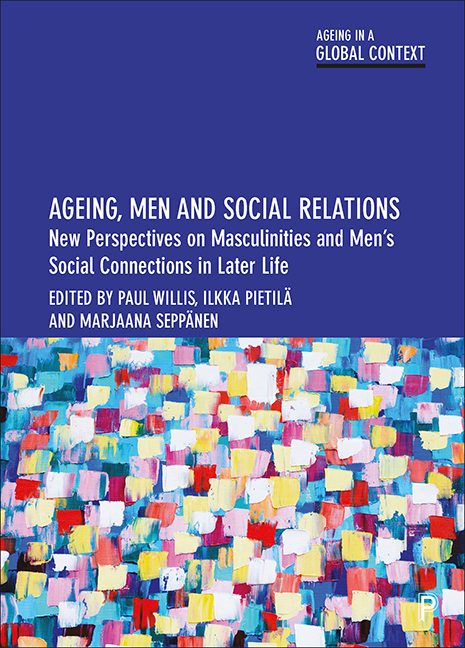 Ageing, Men and Social Relations
Ageing, Men and Social Relations Published online by Cambridge University Press: 18 January 2024
Introduction
In many respects, death is a culturally expected part of human relationships, particularly intimate relationships between couples in mid and later life. For gay men specifically, death in the context of an intimate relationship has a salient history, namely the HIV-related deaths of many gay men from the 1980s onwards. Outside of this specific bereavement context, however, and like most intimate relationships, gay men may experience the loss of a partner for a diversity of reasons. Yet to date, the non-HIV-related bereavement experiences of gay men have received little attention (Patlamazoglou et al, 2018). This chapter explores the experiences of a sample of Australian older gay men who were grappling with the loss of a partner arising from cancer, heart and lung related illnesses, as well as their connections with the deceased.
Historically, research on bereavement proposed that central to the grieving process was the ‘slow and gradual’ severing of emotional and psychological ties with the deceased (Freud, 1917), including detachment and relocation of aspects of the deceased (Stroebe and Schut, 2010). Contemporary research, however, suggests that maintaining bonds with the deceased can constitute a healthy adaptation to bereavement (Wortman and Silver, 2001; Genevro et al, 2004; Steffen and Klass, 2018). Such adaptation can include finding ways to memorialise the deceased and engaging in rituals that allow the bereaved to find ways to maintain a continued bond with the deceased (Worden, 2018). This research highlights the agency of the bereaved to determine what constitutes a meaningful relationship with the deceased. While there is consensus in the literature that maintaining bonds with the deceased is a vital component of grief (Klass and Steffen, 2018), the nature and role of the bonds among bereaved gay men in mid and later life remains unclear.
Research on gay men and bereavement has suggested that while gay men are likely to experience forms of grief on loss on par with other people, there are also aspects of bereavement unique to gay men. These include grieving in a context of heteronormativity, a context in which gay men’s relationships may be stigmatised or not recognised, and their grief is prone to disenfranchisement (Bristowe et al, 2016).
To save this book to your Kindle, first ensure [email protected] is added to your Approved Personal Document E-mail List under your Personal Document Settings on the Manage Your Content and Devices page of your Amazon account. Then enter the ‘name’ part of your Kindle email address below. Find out more about saving to your Kindle.
Note you can select to save to either the @free.kindle.com or @kindle.com variations. ‘@free.kindle.com’ emails are free but can only be saved to your device when it is connected to wi-fi. ‘@kindle.com’ emails can be delivered even when you are not connected to wi-fi, but note that service fees apply.
Find out more about the Kindle Personal Document Service.
To save content items to your account, please confirm that you agree to abide by our usage policies. If this is the first time you use this feature, you will be asked to authorise Cambridge Core to connect with your account. Find out more about saving content to Dropbox.
To save content items to your account, please confirm that you agree to abide by our usage policies. If this is the first time you use this feature, you will be asked to authorise Cambridge Core to connect with your account. Find out more about saving content to Google Drive.